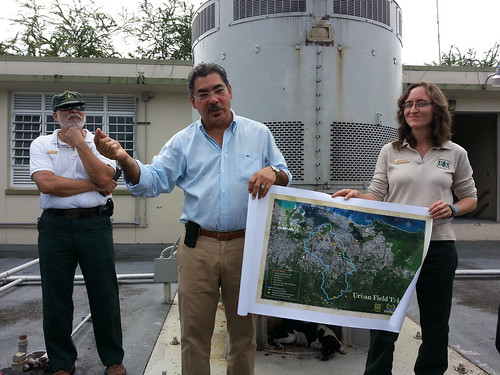
Scientists and community members in Puerto Rico recently celebrated 75 years of tropical forestry research with a diamond jubilee of festivities.
Last month, the International Institute of Tropical Forestry (IITF) hosted an urban field trip, where participants explored several field stations within and around the Río Piedras River watershed in San Juan, Puerto Rico, to learn about the watershed’s vulnerabilities and values in a social, economic and ecological context from Institute scientists and program collaborators. The field trip was led by Institute Director Ariel E. Lugo.
On May 21, the Institute continued its scientific journey as it hosted a science and conservation symposium, which included science, forestry, agriculture, management, and art presentations from keynote speakers from the Forest Service, partner organizations and academic and research institutions from Puerto Rico, Venezuela, Argentina and the contiguous U.S.
“We celebrated our beautiful 75-year relationship with Puerto Rico through which we helped restore deforested lands, increased the people's understanding of tropical forests, and are now working in cities developing solutions to the problems of the Anthropocene,” Lugo said.
The Institute is the Forest Service’s oldest tropical forestry research and technology transfer facility. Created in 1939 as the Tropical Forest Experiment Station, in cooperation with the University of Puerto Rico, the Institute serves as a focal point for bringing research and educational resources to address issues affecting tropical forests and grasslands.
Due to the multicultural composition of the Caribbean, Institute employees have specialized knowledge in various fields, to include bilingual and trilingual scientists, natural resource specialists and program managers. The Institute houses state-of-the-art facilities, laboratories, experimental research forests, a robust tropical forestry library, and has a long tradition of innovative and pioneering collaborations in tropical forestry research. The Institute also houses an International Cooperation unit, which promotes the mission of exchanging knowledge critical to the sustainability of tropical ecosystems through development, training and technical assistance programs. The Institute’s State and Private Forestry programs provide professional, technical and financial assistance to local communities, non-profit organizations, and private landowners in Puerto Rico and the U.S. Virgin Islands. Federal resources are leveraged to protect and support sustainable natural resource management of the islands’ forests and ecosystems to produce goods and services that are important to many local communities.
During its first 30 years, the Institute described all—more than 750—tree species in Puerto Rico, developed some of the earliest tree plantations in the Neotropics, and refined procedures for reforesting degraded lands. In an effort to save the endangered Puerto Rican Parrot, research was also expanded to include wildlife biology. The Institute inevitably became an international training center for tropical foresters from Puerto Rico, the Caribbean and Latin America. Over the next 20 years, ecosystem science was introduced to the tropics through the rainforest radiation experiment. The Institute also administered the oldest permanent plots on Neotropical and tropical forests, and described the growth rate patterns of tropical trees.



